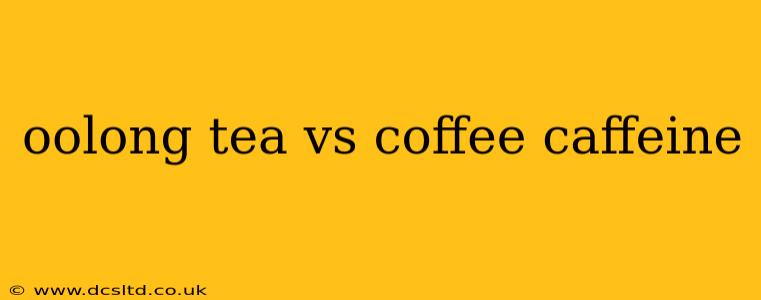The morning ritual: a steaming cup of something to jumpstart the day. For many, that choice boils down to coffee versus tea, specifically oolong tea. But which beverage reigns supreme when it comes to the caffeine kick? Let's dive into a detailed comparison of oolong tea and coffee, focusing on their caffeine content and other key differences.
How Much Caffeine is in Oolong Tea vs. Coffee?
The caffeine content in both oolong tea and coffee varies significantly depending on several factors. Let's break it down:
Coffee: A standard 8-ounce cup of brewed coffee contains anywhere from 80 to 175 milligrams (mg) of caffeine. This depends on the type of bean, roast level, brewing method, and the coffee-to-water ratio. Espresso generally packs a higher caffeine punch than drip coffee.
Oolong Tea: Oolong tea sits somewhere in the middle ground between black tea and green tea in terms of caffeine. An 8-ounce cup typically contains between 25 and 50 mg of caffeine. The oxidation level of the oolong tea leaves plays a significant role. Heavily oxidized oolong teas tend to have more caffeine than lightly oxidized ones.
The Verdict: Coffee generally contains significantly more caffeine than oolong tea. However, even within coffee and oolong tea, there's a wide range of caffeine levels.
What are the Other Differences Between Oolong Tea and Coffee?
Beyond caffeine content, there are other crucial differences to consider:
Taste and Flavor Profiles
Coffee: Offers a robust, often bitter taste, with notes ranging from nutty and chocolatey to fruity and floral depending on the bean and roast. The flavor profile is generally bolder and more intense.
Oolong Tea: Possesses a more nuanced flavor profile, often described as floral, fruity, or subtly sweet, depending on the variety. The taste is smoother and less intense than coffee, with some varieties even exhibiting a slightly savory undertone.
Health Benefits
Both coffee and oolong tea have been associated with various health benefits, although more research is needed to fully understand their long-term effects.
Coffee: Studies suggest that coffee consumption might be linked to a reduced risk of type 2 diabetes, Parkinson's disease, and certain types of cancer. However, excessive coffee consumption can lead to anxiety, insomnia, and digestive issues.
Oolong Tea: Oolong tea is rich in antioxidants, which are believed to protect against cell damage. Some studies suggest it may help with weight management, improve cardiovascular health, and boost brain function.
How does the caffeine in oolong tea compare to other teas?
Oolong tea occupies a middle ground in terms of caffeine content among different types of tea. Black tea generally has a higher caffeine level than oolong tea, while green tea has a lower caffeine level. White tea contains the least amount of caffeine among commonly consumed teas.
Does the caffeine in oolong tea affect sleep?
The caffeine content in oolong tea is generally lower than in coffee, making it less likely to disrupt sleep. However, sensitivity to caffeine varies between individuals. Consuming oolong tea later in the day could still affect sleep in some people, particularly those sensitive to caffeine.
Are there different caffeine levels in different types of oolong tea?
Yes, the level of caffeine in oolong tea can vary depending on several factors, including the degree of oxidation during processing. More oxidized oolong teas tend to have higher caffeine content compared to less oxidized varieties. The specific cultivar of the tea plant also plays a role.
Conclusion
The choice between oolong tea and coffee ultimately depends on individual preferences and needs. Coffee generally provides a stronger and more immediate caffeine boost, while oolong tea offers a milder, more nuanced experience with a potentially wider array of health benefits. Consider your caffeine tolerance, preferred taste, and desired health effects when making your decision. Remember to consume both beverages in moderation to minimize potential negative side effects.
